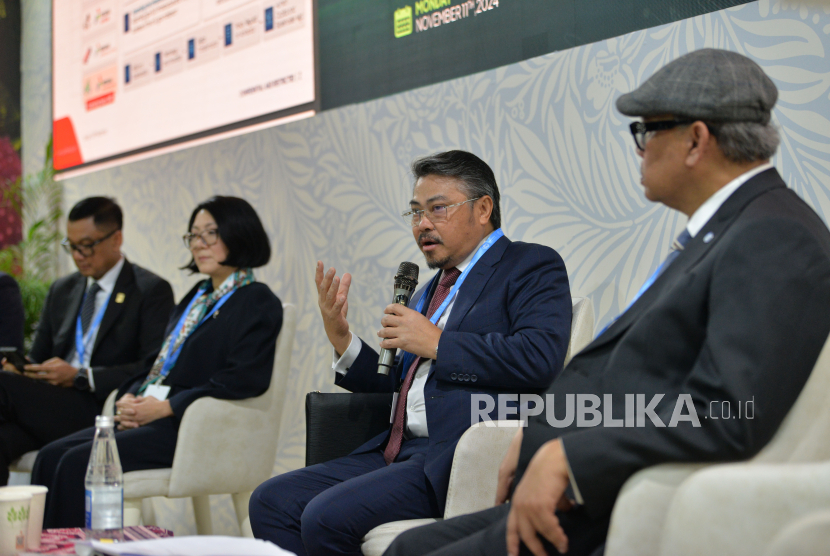REPUBLIKA.CO.ID, BAKU -- Pertamina New & Renewable Energy (NRE) CEO John Anis highlighted the important role and challenges that Pertamina faces in supporting the energy transition to zero-emissions. Pertamina, according to Anis, has a mandate to encourage national decarbonization while maintaining growth and energy resilience in Indonesia.
“So this is one of the first and main mandates to support the decarbonization of the country. Of course, also growth and energy resistance. At the same time, given that Pertamina has many upstream businesses that are still in fossil fuels, then we have to start new businesses for the future of our own company,” Anis said at the discussion panel “Driving the Renewable Revolution: Unleashing Indonesia's Renewable Energy Ambition” at the Indonesian Pavilion at the UN Climate Change Meeting (COP29) Wednesday (13/11/2024).
The strategy being executed, he added, is a dual growth strategy that balances the need for cleaner fossil fuels while developing green energy.
One of Pertamina's internal decarbonization efforts, Anis continued, received recognition from third parties with an ESG rating of 20.7 — the first in the integrated oil and gas sub-industry. It demonstrates significant efforts in the management of medium to low risks related to environmental impacts.
However, Anis revealed a number of major challenges in Indonesia's energy transition. The main challenge is the mismatch between renewable energy sources and the location of energy demand. “Because, you know, most of the renewable energy, they can produce in situ. For example, I can't move geothermal from Kamojang to Cirebon. It must be produced in situ. It requires additional infrastructure, which is transmission,” he explained.
In situ Power Generation refers to the process of generating electrical energy in the same location or place where that energy will be used. In contrast to the generation of electricity in large power plants which is then distributed over the power grid to various locations.
Anis said the affordability of the technology is also a challenge, especially for green hydrogen. “We continue to look for cheaper and efficient technologies to accelerate the transition to green energy, including hydrogen,” he added.
In this context, high costs and technologies require breakthroughs in order for green hydrogen to be produced more cheaply. Financing pilot projects and large-scale projects is also another challenge. Anis explained competitive financing is urgently needed to make green energy more affordable.
“Funding for pilot projects is crucial, and competitive financing will make renewable energy projects more profitable.“
In addition, the regulatory framework also plays an important role in supporting the energy transition. Although the government has provided various supports and incentives, Anis mentioned some regulatory issues that still need to be adjusted, including taxes related to biofuel products.
Pertamina is also trying to overcome human resource limitations in the green energy industry by sending employees to study abroad and establishing cooperation with global industries. “We are trying to be proactive so that our HR can get the best skills and return to Indonesia to develop a green energy business,” Anis said.
With these challenges, Anis reiterated Pertamina's ambition to increase its renewable energy portfolio to 6 gigawatts by 2030 from its current capacity of 2.6 gigawatts. To achieve this, Pertamina is targeting an investment of 6 billion US dollars. Pertamina also plans to increase geothermal capacity from the current 672 megawatts to 3 gigawatts by 2032.
In addition to geothermal, Pertamina is also developing its green hydrogen business by running pilot projects and cooperating with the government in regulatory and safety aspects. “We plan to launch two to three green hydrogen pilot projects that use geothermal as its energy source,” Anis said.
The project is expected to accelerate the transition of transportation to cleaner fuels. The development of vegetable fuels is also one of Pertamina's focuses in supporting energy sustainability. For biodiesel, Pertamina has managed to reduce diesel imports by including 35 biodiesel distribution points in Indonesia.
On the other hand, Pertamina is now developing biothanol production with non-food raw materials such as molasses, a side result of sugar production that does not compete with food.
Anis stressed the importance of maintaining food security in choosing biofuel feedstocks. “We strive to ensure biofuel feedstocks do not interfere with food production, and we are working with PTPN to develop bioethanol from molasses,” he explained.
Pertamina also established cooperation with MIND ID in the development of nickel-based batteries to support the transport and energy storage sectors. “Batteries are indispensable not only for cars, but also for storing energy from solar panels in order to provide the base load,” Anis said.
On the other hand, Pertamina is also increasing its carbon trading portfolio as part of its decarbonisation strategy. “We have two sources of carbon certificates — a technology-based solution from our green plant and a nature-based solution in collaboration with Perhutani,” Anis said.
These carbon certificates are expected to help industries offset their emissions. In addition, Anis affirmed that Pertamina continues to be committed to providing clean and reliable energy for domestic and international markets. “We are supporting domestic energy needs as a top priority, but also expanding into international markets as proof that we are a global player in clean energy,” Anis said.
In the face of major challenges in the renewable energy sector, Pertamina is optimistic with collaboration and support from various parties. With its potential, Anis believes Indonesia can overcome existing barriers and achieve its ambition as a country with sustainable green energy.


